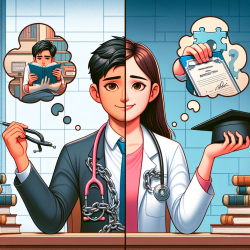Introduction
In the demanding world of medical education, mental health challenges are not uncommon. However, the reluctance to disclose mental health issues remains a significant barrier for medical students. A recent study titled "An exploration of medical student attitudes towards disclosure of mental illness" sheds light on this issue, revealing the underlying fears and misconceptions that prevent students from seeking help or disclosing their mental health status.
The Study: Key Findings
The study conducted at the University of New Mexico School of Medicine (UNM SOM) surveyed students to understand their willingness to disclose mental health diagnoses on medical licensing applications. The results were telling:
- 36% of respondents reported having a mental health condition prior to medical school.
- 47% perceived a decline in their mental health during medical school.
- 51% would not disclose a mental health diagnosis on a New Mexico Medical Board (NMMB) license application.
The primary reasons for non-disclosure included fear of stigmatization, fear of repercussions, and a belief that such disclosure was irrelevant.
Implications for Practitioners
These findings highlight the critical need for medical educators and practitioners to address the stigma surrounding mental health. Here are some strategies to consider:
- Promote a Supportive Environment: Create a culture where mental health is openly discussed and supported. Encourage students to seek help without fear of judgment.
- Revise Licensing Questions: Advocate for changes in licensing applications to focus on current impairments rather than past diagnoses, reducing unnecessary barriers to disclosure.
- Provide Resources: Ensure that mental health resources are readily available and accessible to students, emphasizing confidentiality and support.
Encouraging Further Research
While this study provides valuable insights, it also opens the door for further research. Understanding the nuances of mental health disclosure across different medical schools and states can lead to more comprehensive solutions. Practitioners are encouraged to explore these areas and contribute to a growing body of knowledge aimed at improving mental health support in medical education.
Conclusion
Addressing the barriers to mental health disclosure is crucial for building a healthier physician workforce. By fostering an environment of support and understanding, we can help medical students navigate their mental health challenges and ultimately improve patient care.
To read the original research paper, please follow this link: An exploration of medical student attitudes towards disclosure of mental illness.










